“You, from all your different ethnic groups, you who have suffered and are still suffering, you who do not want to respond to evil with more evil. You, who choose fraternity and forgiveness, are even now cultivating a better tomorrow ... Be seeds of hope, which make it possible for us already to glimpse the tree that one day, hopefully in the near future, will bear fruit,” Pope Francis said, encouraging hope among the refugees and the internally displaced.
 Nyakuor Rebecca speaks to Pope Francis during a gathering with refugees in Juba, South Sudan, on Feb. 4, 2023. Vatican Media
Nyakuor Rebecca speaks to Pope Francis during a gathering with refugees in Juba, South Sudan, on Feb. 4, 2023. Vatican Media
Overall, Pope Francis demonstrated a deeper understanding of Africa by delivering messages that the people of God on the continent resonated with. For instance, his May 2015 Encyclical Letter on care for our common home, Laudato Si’ inspired multiple initiatives on the continent, which various entities spearheaded, including the Laudato Si' Movement - Africa. His decision to establish the World Day for Grandparents and the Elderly in January 2021 was lauded in Africa.
 Pope Francis arrived in the Democratic Republic of Congo on Jan. 31, 2023. The streets of the pope’s five-mile drive from the N’Dolo Airport to the presidential residence were lined with thousands of locals who cheered and waved flags. Credit: Vatican Media
Pope Francis arrived in the Democratic Republic of Congo on Jan. 31, 2023. The streets of the pope’s five-mile drive from the N’Dolo Airport to the presidential residence were lined with thousands of locals who cheered and waved flags. Credit: Vatican Media
Many Africans, including theologians, have lauded Pope Francis for the multi-year Synod on Synodality, which he extended to 2024. This initiative “became a very exciting moment for the whole Church,” Fr. Ambrose John Bwangatto recalled in a get-well-soon message to Pope Francis through ACI Africa on 26 February 2026. Alluding to the Synod on Synodality initiative, the Director of programs at the Pan-African Catholic Theology and Pastoral Network (PACTPAN), Sr. Jane Joan Kimathi shared, “Pope Francis is a prophetic voice in a wounded world, a shepherd who embodies compassion, justice, and inclusivity. His leadership reflects the African spirit of Ubuntu (I am because we are), emphasizing community over exclusion, mercy over judgment, and solidarity with the marginalized.” Pope Francis, the Kenyan Sister further said, “is a bridge-builder, much like the African elders who mediate conflicts, seeking not division but reconciliation. His call for a synodal Church, one that walks together resonates deeply with African traditions of communal decision-making, where wisdom is not imposed from above but discerned in dialogue.”
(Story continues below)
 Pope Francis arrives for Mass in Antananarivo, Madagascar Sept. 8, 2019. | Edward Pentin/CNA.
Pope Francis arrives for Mass in Antananarivo, Madagascar Sept. 8, 2019. | Edward Pentin/CNA.
Sharp words of caution on exploiting Africa
Pope Francis’ great love for Africa was demonstrated by his caution against exploitation of the continent’s people and resources. He demonstrated a greater understanding of the ongoing exploitation of the continent and tried to show Africans that they can unchain themselves from abuse. In his speech in DRC on 31 January 2023, Pope Francis talked tough to the international community. “This country and this continent deserve to be respected and listened to; they deserve to find space and receive attention,” he said, and amid cheers added, “Hands off the Democratic Republic of the Congo! Hands off Africa! Stop choking Africa: Africa is not a mine to be stripped or a terrain to be plundered.” Pope Francis implored, “May Africa be the protagonist of its own destiny! May the world acknowledge the catastrophic things that were done over the centuries to the detriment of the local peoples, and not forget this country and this continent.”
 Pope Francis meets with bishops in Madagascar Sept. 7, 2019. Credit: Vatican Media.
Pope Francis meets with bishops in Madagascar Sept. 7, 2019. Credit: Vatican Media.
Earlier, speaking during the virtual dialogue with Catholic youths from universities in Africa that the Pan-African Catholic Theology and Pastoral Network (PACTPAN) organized on the Solemnity of All Saints’ Day 2022, Pope Francis cautioned Africa’s youths against enslavement. “Please continue working, striving for your future; don’t allow yourselves to be enslaved; be cautious and make sure you stay alive,” Pope Francis said on 1 November 2022. Manifesting his great love for Africa’s people, Pope Francis encouraged youths in Africa to believe in themselves. In sharp words of caution, Pope Francis told youths in Africa, “Do not underestimate yourselves; do not be afraid, organize, struggle; do not allow yourselves to be turned into slaves.”
A Moment of Misgiving
The 18 December 2023 Vatican publication, Fiducia Supplicans (FS), permitting members of the Clergy to bless “same-sex couples” and couples in other “irregular situations”, was a moment of misgiving in the relationship between Pope Francis and Africa. For days and weeks, reactions continued to pour in from Catholic Church leaders in Africa on the document that the Dicastery for the Doctrine of Faith (DDF) released days to Christmas Day 2023. Indeed, FS was met with sharp from Catholic Bishops.
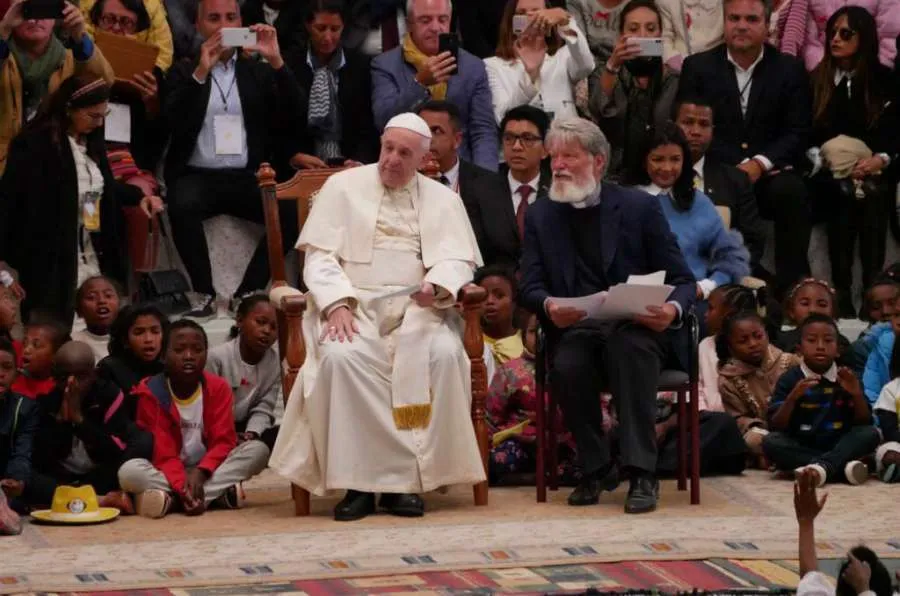 Pope Francis and Fr. Pedro Opeka in Akamasoa, the "City of Friendship," in Madagascar 08 September 2019.
Pope Francis and Fr. Pedro Opeka in Akamasoa, the "City of Friendship," in Madagascar 08 September 2019.
A couple of illustrations: Malawi and Kenya
On the eve of 2023 Christmas Day, Bishop Martin Mtumbuka of Malawi’s Karonga Catholic Diocese called upon the people of God in his Episcopal See to “forget and ignore this controversial and apparently blasphemous declaration in its entirety.” In his “honest reflection”, he dismissed FS “even if by doing so, I’m reflecting publicly on a document signed by the Holy Father.”
“But I have to, because it is important that you faithful of this Diocese, entrusted to my pastoral care by the same Holy Father are guided, are supported, and are strengthened at this moment,” Bishop Mtumbuka said. He poked holes in the document, posing, “Was this letter written to please homosexuals and their promoters? We don’t know. Can the Church depart from its rightful path simply to please a certain people who live in immoral unions? If yes, why could this be done?” He continued, “Do pastors do things like this in good faith? Or was this document written mainly to gain cheap popularity?” He added, “It would seem in many parts of the world, certainly many people have celebrated this document as a sign of progress in the church, and the popularity of its drafters has certainly increased.”
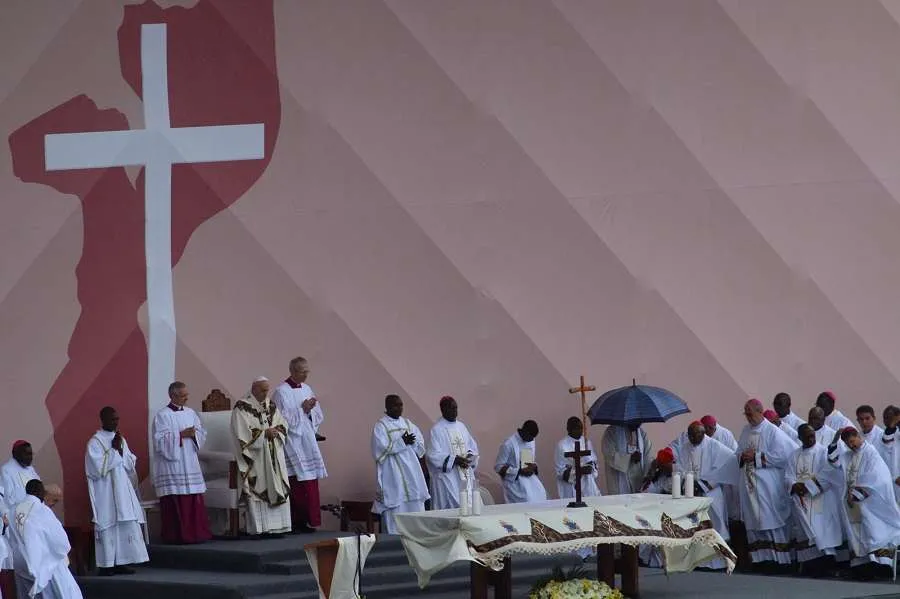 Pope Francis celebrates Mass in Maputo, Mozambique Sept. 6, 2019. Credit: Edward Pentin/CNA.
Pope Francis celebrates Mass in Maputo, Mozambique Sept. 6, 2019. Credit: Edward Pentin/CNA.
FS, the Catholic Bishop of Karonga since his Episcopal Consecration in November 2010 said, “looks to us like a heresy; it reads like a heresy; and its effects a heresy.”
In Kenya, Bishop Paul Kariuki Njiru of Wote Diocese said that FS “should be rejected in totality”. In the letter he issued on 27 December 2023, he faulted the DDF Prefect, Víctor Manuel Cardinal Fernández, for not consulting “widely”. Cardinal Fernandez “should have widely done enough consultation before releasing such a controversial declaration. His idea and thought that Cardinals and Bishops cannot prohibit what Pope Francis has permitted with Fiducia Supplicans is mistaken,” Bishop Kariuki said.
He cited the Acts of the Apostles, saying, “We Bishops, like Saints Peter and John, we will say ‘Judge for yourselves whether it is right in God's sight for us to obey you rather than God’". Bishop Kariuki eventually directed, “Since this declaration totally contradicts what Pope Francis himself approved in 2021 concerning same-sex unions … because the Church cannot ask God to bless sin, I hereby prohibit all priests in the Catholic Diocese of Wote from blessing of couples in irregular situation or same-sex couples.”
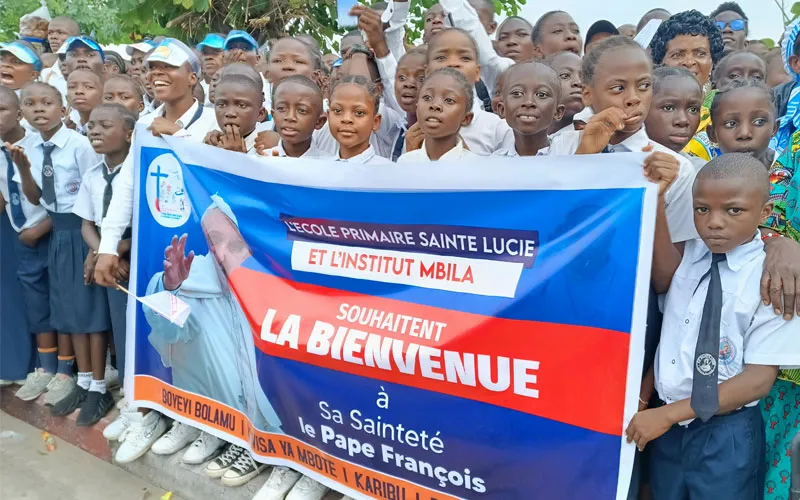 Students at the Ndjili Airport to welcome Pope Francis to DR Congo. Credit: ACI Africa
Students at the Ndjili Airport to welcome Pope Francis to DR Congo. Credit: ACI Africa
Africa’s Bishops, SECAM
The leadership of the Symposium of Episcopal Conference of Africa and Madagascar (SECAM) was strategic in handling the misgiving. Just two days after FS was released, SECAM President, Fridolin Cardinal Ambongo, reached out to his colleagues across the continent through Presidents of Catholic Bishops’ Conferences in view of providing an “unequivocal clarity” on the misgiving and the deep division FS had occasioned.
While gathering feedback from the dozens of Catholic Bishops’ Conferences across Africa, Cardinal Ambongo also engaged the Vatican. In an audio recording, the Congolese Cardinal recalled his decision to travel to Rome that he said was preceded by a seven-page letter to Pope Francis on the misgiving about FS. In the recording, he recounted the process that resulted in the 11 January 2024 five-page statement in which he declared that FS will not be implemented in Africa. “With the prefect (Cardinal Fernandez), myself in front of the computer, a secretary writing, we prepared a document,” Cardinal Ambongo recalled, adding, “We prepared the document in dialogue and agreement with Pope Francis, so that at every moment we called him to ask him questions, to see if he agreed with that formulation.”
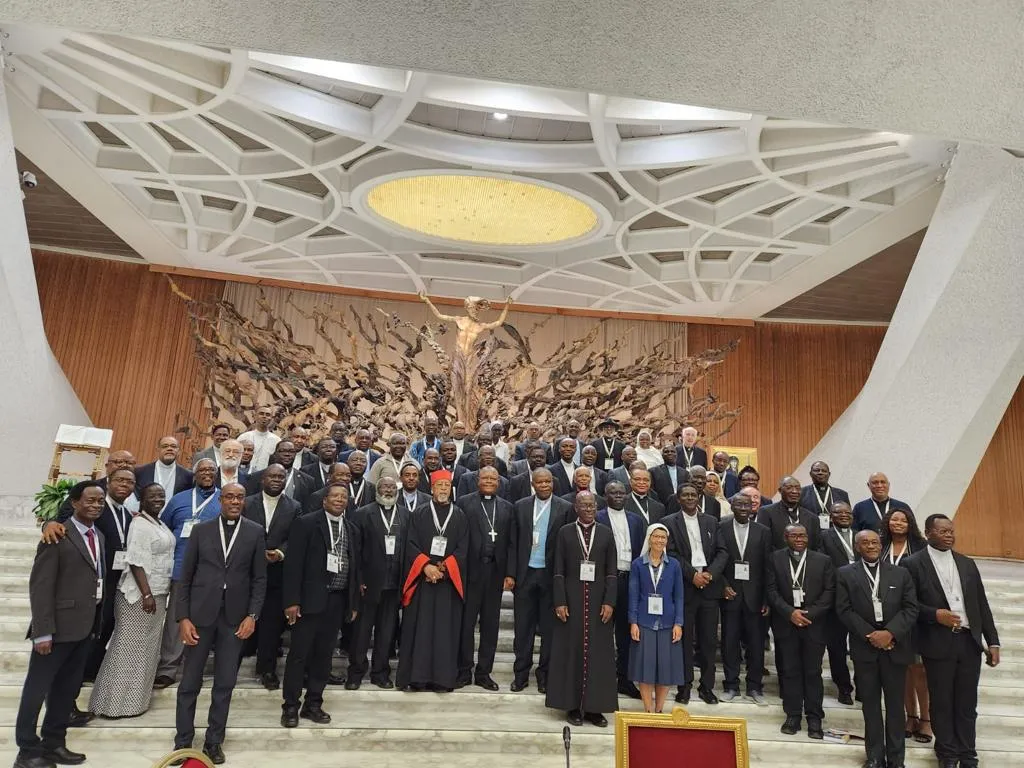 African delegates in the 16th Ordinary General Assembly of the Synod of Bishops in Rome. Credit: Vatican Media
African delegates in the 16th Ordinary General Assembly of the Synod of Bishops in Rome. Credit: Vatican Media
He continued, “I signed the document as President of SECAM on behalf of the entire Catholic Church in Africa. And the Prefect of the Vatican Dicastery signed it, not the document that was made public, but the document that we keep in the archives. The document is titled ‘No to the blessing of homosexual couples in the Catholic Churches.’”
Although the text appears to have been signed in Accra, Ghana, the headquarters of SECAM, in reality, “I signed it in Rome,” the Cardinal clarified about the statement in which he declared, “The Episcopal Conferences of all Africa, which have strongly reaffirmed their communion with Pope Francis, believe that the extra-liturgical blessings proposed in the declaration Fiducia Supplicans cannot be carried out in Africa without exposing themselves to scandals.”
“This is to express our position today in Africa and we do it in a spirit of communion, of synodality with Pope Francis, and with the prefect of the Dicastery for the Doctrine of the Faith: In Africa there is no place to bless homosexual couples. Not at all,” he stressed.
Was the misgiving resolved?
On 13 January 2024, Pope Francis was quoted as explaining that FS was not to be implemented in Africa “because the culture does not accept it.” Much more seems to have been omitted in Pope Francis’ explanation in his closed-door meeting with 800 Catholic Priests from the Diocese of Rome in the Archbasilica of St. John Lateran as Italian media outlets, including the Italian news channel, Sky TG24, reported. The “consolidated summary” of the responses of the Conferences of Catholic Bishops in Africa, which Cardinal Ambongo had issued on 11 January 2024 went beyond cultures in Africa.
SECAM statement cited a previous DDF Declaration on homosexuality, the Catechism of the Catholic Church (CCC), the Sacred Scriptures, and the language used in FS as additional reasons for rejecting the DDF Declaration on the continent. “The constant teaching of the Church describes homosexual acts as ‘intrinsically disordered,’” Catholic Bishops in Africa said, referencing the DDF 29 December 1975 “Declaration on certain questions concerning sexual ethics”, Persona Humana. Homosexual acts, “considered as closing the sexual act to the gift of life and not proceeding from a genuine affective and sexual complementarity, must not be approved under any circumstances,” they added citing CCC 2357.
SECAM statement also cited Biblical “passages which condemn homosexuality, notably Lv 18:22-23 where homosexuality is explicitly prohibited and considered an abomination.” It cited the “scandal of the homosexuals in Sodom” in Genesis 19, which demonstrates that “homosexuality is so abominable that it will lead to the destruction of the city.”
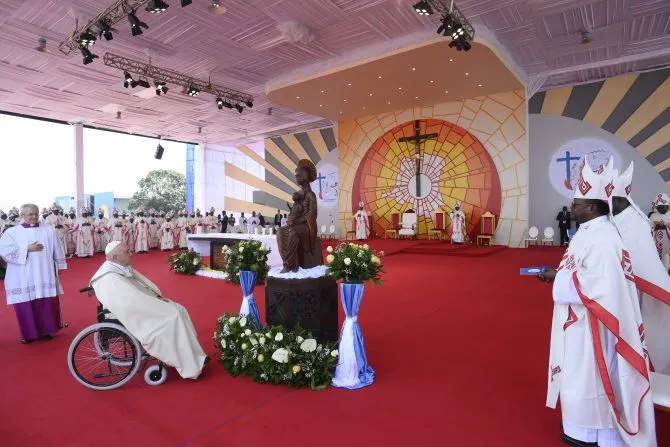 Pope Francis celebrated Mass with around 1 million people in Kinshasa, DRC, on Feb. 1, 2023. | Vatican Media
Pope Francis celebrated Mass with around 1 million people in Kinshasa, DRC, on Feb. 1, 2023. | Vatican Media
On the language in FS, SECAM statement indicated that FS is “too subtle for simple people to understand.” FS language “remains very difficult to be convincing that people of the same sex who live in a stable union do not claim the legitimacy of their own status,” it stated.
In the SECAM statement that aimed to put an end to the misgiving in the relationship between Pope Francis and Africa, Africa’s Catholic Bishops were forthright. Rather than impart blessings upon “same-sex couples” and couples in other “irregular situations” as FS proposed, they underscored the need “for the conversion of all”. On his part, in engaging SECAM President and putting him in contact with the DDF Prefect, Pope Francis allowed the Church in Africa to contextual the document he endorsed; nothing had been cast in stone.
ACI Africa was founded in 2019. We provide free, up-to-the-minute news affecting the Catholic Church in Africa, giving particular emphasis to the words of the Holy Father and happenings of the Holy See, to any person with access to the internet. ACI Africa is proud to offer free access to its news items to Catholic dioceses, parishes, and websites, in order to increase awareness of the activities of the universal Church and to foster a sense of Catholic thought and culture in the life of every Catholic.
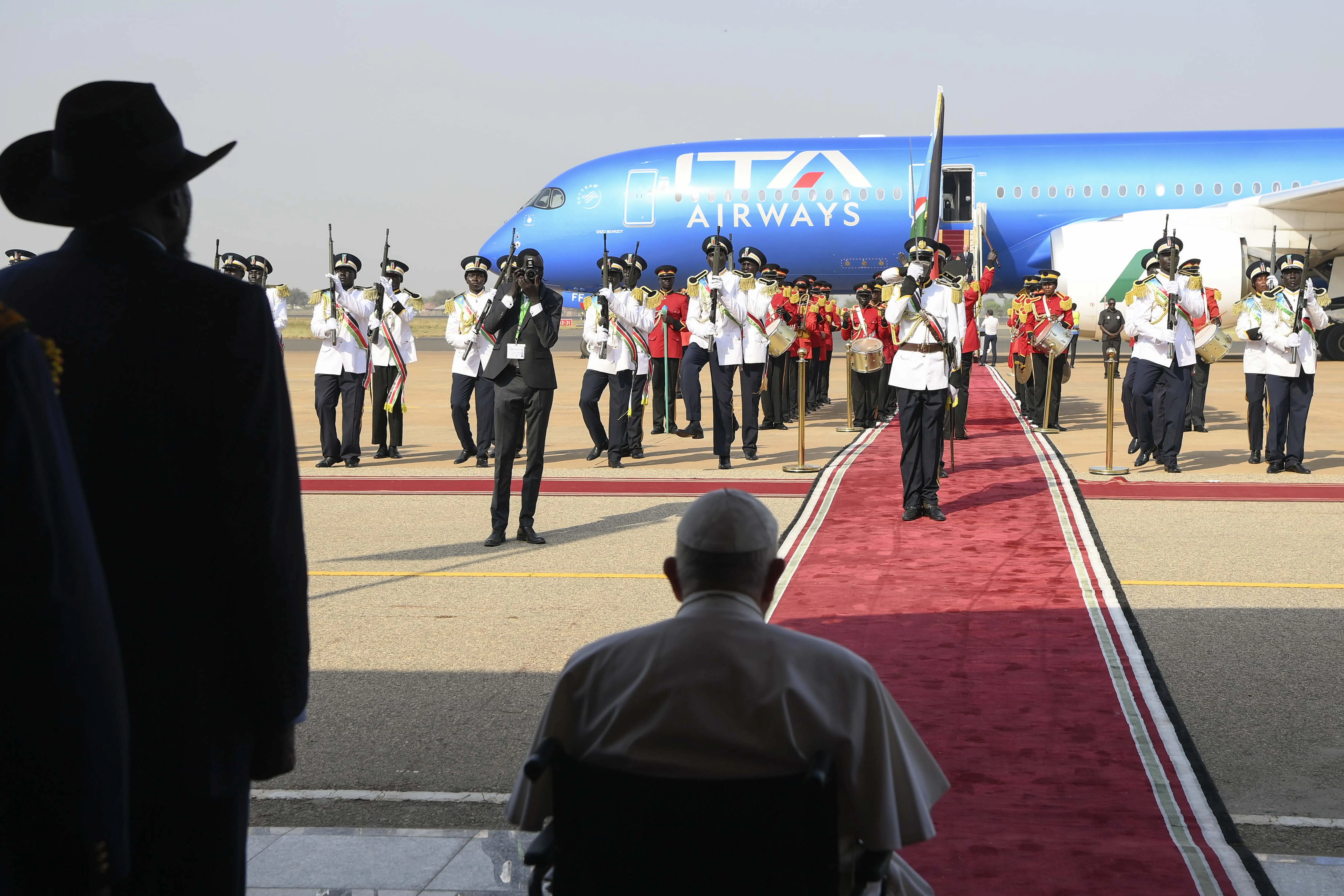 Pope Francis landed in South Sudan on Feb. 3, 2023, becoming the first pope to visit the country and fulfilling a yearslong hope to carry out an ecumenical trip to the war-torn country.
Pope Francis landed in South Sudan on Feb. 3, 2023, becoming the first pope to visit the country and fulfilling a yearslong hope to carry out an ecumenical trip to the war-torn country.



 Pope Francis arrives to meet with youth at Kasarani stadium in Kenya on Nov. 27, 2015. | Martha Caldarón/CNA.
Pope Francis arrives to meet with youth at Kasarani stadium in Kenya on Nov. 27, 2015. | Martha Caldarón/CNA. Pope Francis is greeted at the N’Dolo Airport in the Democratic Republic of Congo on Jan. 31, 2023. | Credit: Vatican Media
Pope Francis is greeted at the N’Dolo Airport in the Democratic Republic of Congo on Jan. 31, 2023. | Credit: Vatican Media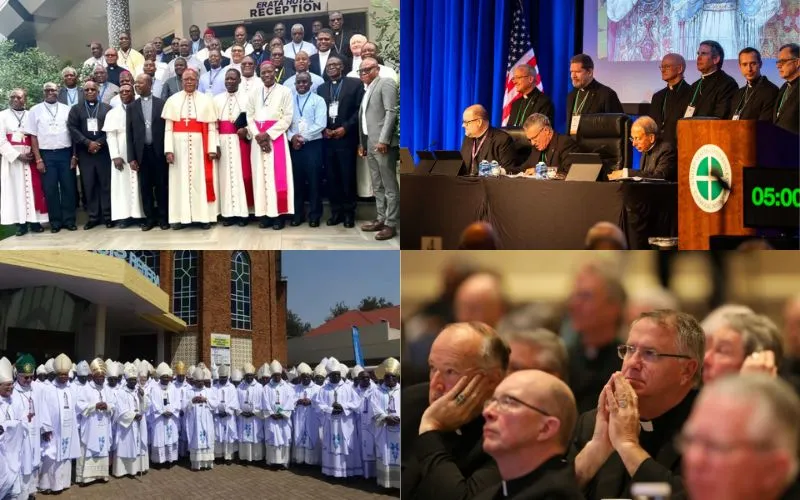
 Pope Francis greets South Sudanese President Salva Kiir at the Vatican, April 11, 2019. | Vatican Media
Pope Francis greets South Sudanese President Salva Kiir at the Vatican, April 11, 2019. | Vatican Media Pope Francis walks with Pres. Uhuru Kenyatta at the State House in Nairobi, Kenya on 26 November 2015.
Pope Francis walks with Pres. Uhuru Kenyatta at the State House in Nairobi, Kenya on 26 November 2015.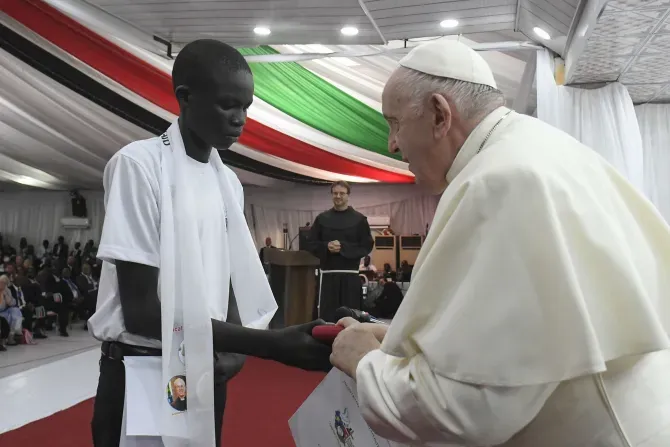 Pope Francis meets a boy living in an IDP camp during a gathering in Juba, South Sudan, on Feb. 4, 2023. | Vatican Media
Pope Francis meets a boy living in an IDP camp during a gathering in Juba, South Sudan, on Feb. 4, 2023. | Vatican Media Nyakuor Rebecca speaks to Pope Francis during a gathering with refugees in Juba, South Sudan, on Feb. 4, 2023. Vatican Media
Nyakuor Rebecca speaks to Pope Francis during a gathering with refugees in Juba, South Sudan, on Feb. 4, 2023. Vatican Media Pope Francis arrived in the Democratic Republic of Congo on Jan. 31, 2023. The streets of the pope’s five-mile drive from the N’Dolo Airport to the presidential residence were lined with thousands of locals who cheered and waved flags. Credit: Vatican Media
Pope Francis arrived in the Democratic Republic of Congo on Jan. 31, 2023. The streets of the pope’s five-mile drive from the N’Dolo Airport to the presidential residence were lined with thousands of locals who cheered and waved flags. Credit: Vatican Media Pope Francis arrives for Mass in Antananarivo, Madagascar Sept. 8, 2019. | Edward Pentin/CNA.
Pope Francis arrives for Mass in Antananarivo, Madagascar Sept. 8, 2019. | Edward Pentin/CNA. Pope Francis meets with bishops in Madagascar Sept. 7, 2019. Credit: Vatican Media.
Pope Francis meets with bishops in Madagascar Sept. 7, 2019. Credit: Vatican Media. Pope Francis and Fr. Pedro Opeka in Akamasoa, the "City of Friendship," in Madagascar 08 September 2019.
Pope Francis and Fr. Pedro Opeka in Akamasoa, the "City of Friendship," in Madagascar 08 September 2019. Pope Francis celebrates Mass in Maputo, Mozambique Sept. 6, 2019. Credit: Edward Pentin/CNA.
Pope Francis celebrates Mass in Maputo, Mozambique Sept. 6, 2019. Credit: Edward Pentin/CNA. Students at the Ndjili Airport to welcome Pope Francis to DR Congo. Credit: ACI Africa
Students at the Ndjili Airport to welcome Pope Francis to DR Congo. Credit: ACI Africa African delegates in the 16th Ordinary General Assembly of the Synod of Bishops in Rome. Credit: Vatican Media
African delegates in the 16th Ordinary General Assembly of the Synod of Bishops in Rome. Credit: Vatican Media Pope Francis celebrated Mass with around 1 million people in Kinshasa, DRC, on Feb. 1, 2023. | Vatican Media
Pope Francis celebrated Mass with around 1 million people in Kinshasa, DRC, on Feb. 1, 2023. | Vatican Media


